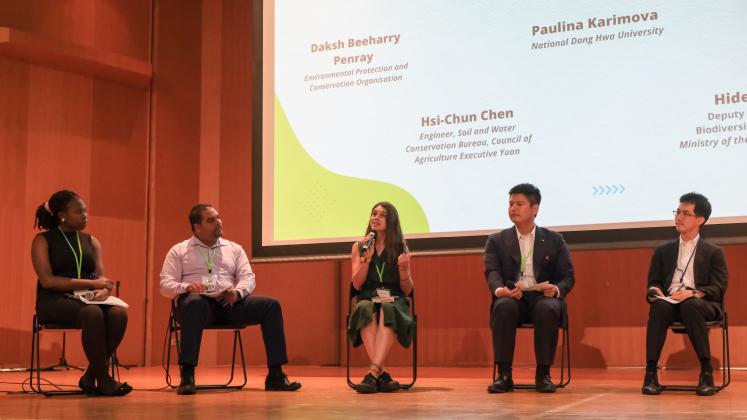On 8 July 2023, UNU-IAS co-organised a public forum in Akita, Japan, on the theme Reshaping Our Future: Youth Empowerment and Contribution to Living in Harmony with Nature as part of the 9th Global Conference of the International Partnership for the Satoyama Initiative (IPSI). The event discussed how to engage young people to advance local and global conservation efforts. The forum was co-organised with the Global Youth Biodiversity Network (GYBN), Akita International University (AIU), and the Ministry of the Environment, Japan.
Opening the session, Shinobu Yume Yamaguchi (Director, UNU-IAS) emphasised that the Kunming–Montreal Global Biodiversity Framework (GBF) prioritises a whole-of-society approach to ensure the sustainable and equitable use of natural resources. In addition to political will, concerted action by all stakeholders at all levels is needed, and it is crucial to include the voices of young people to ensure harmonious coexistence between humans and nature.
Noting that biodiversity was crucial to human welfare, Monte Cassim (President, AIU) highlighted that the loss of large animal habitats was linked to the rise of zoonotic diseases such as COVID-19. He pointed out that protected areas were insufficient to maintain and foster Earth’s biological diversity, and that other ecological conservation measures (OECS) provided space for creative solutions.
Christian Schwarzer (Co-founder, GYBN) stressed that implementing the GBF required political support from all government departments, not only environment ministries. He called on all sectors of the economy and society to fully recognise the importance of biodiversity conservation, as intersectional environmentalism was key to realising a society in harmony with nature.
Introducing the mission and objectives of IPSI, Alexandra Franco (Communications Associate, UNU-IAS) explained that it aimed to support implementation of the GBF by promoting sustainable production, traditional knowledge, and community engagement.
Melina Sakiyama (Co-founder, GYBN) observed that young people sought a fundamental, system-wide strategic reorganisation across sectors, emphasising that society lacked a good understanding of how to work with youth. She added that youth engagement should avoid tokenism, and must acknowledge diversity among youth voices and experiences.
Panel discussions focused on the potential of youth engagement in promoting socio-ecological production landscapes (SEPLS), intergenerational knowledge transfer, and overcoming barriers to youth engagement. Panelists discussed the urban–rural divide, the lack of universal access to technology, and reluctance to include youth in decision making due to lack of experience. Solutions proposed included mentorship programmes; opportunities to participate in local policymaking; workshops and collaborative projects to gain practical experience; and financial support for youth-led conservation efforts. Speakers agreed that age was not the only dimension of youth — rather, open-minded attitudes and enthusiasm are needed to solve the biodiversity crisis.
In closing, Kazuhiko Takeuchi (President, Institute for Global Environmental Studies; Visiting Professor, UNU-IAS) concluded that while the seriousness of climate change and biodiversity loss must be recognised, it was important to maintain a hopeful attitude and encourage youth to share their ideas. Alfred Oteng-Yeboah (Chair, Ghana National Biodiversity Committee; Chair, Steering Committee of IPSI) emphasised that intergenerational partnerships were crucial to harnessing the creativity and innovation of young people.

